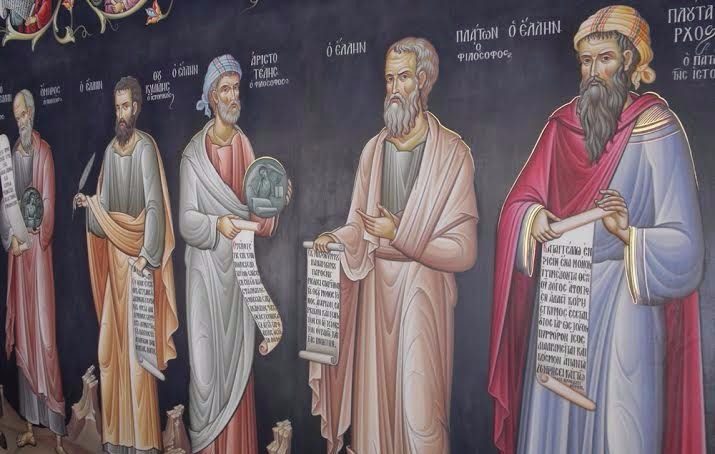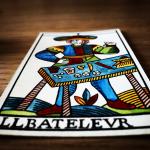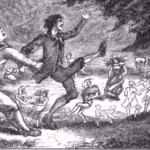When you think of philosophy you probably think of the famous Greek trio Socrates, Plato, and Aristotle. These men dominate the history of philosophy from ancient times onward. Their brilliance was sought after later by Christians who wanted to show that their God was the true God. This was done by reinterpreting the polytheistic philosophers of Greece, by distorting their words and teachings, maintaining that their teachings were a precursor for monotheism, and that the philosophers rejected polytheism.
Christian church fathers hated Greek philosophy. John Chrysostom described Greeks as “dogs” whose philosophy was “worthless”.[1] Eusebius characterized Hellenism as Greek “excrement” and said it was “loathsome.”[2] Nevertheless, Christianity needed to put into the minds of the people that there was a continuity and cohesion between polytheistic Greek culture and the monotheistic Christian religion. A visual example of this can be found on the walls of one of the Meteora monasteries in Greece where Homer, Thucydides, Aristotle, Plato, and Plutarch are depicted, icon style. This is the Church’s revision of history and philosophy.

What did the philosophers teach? How are they being misrepresented? Why do Christians think the philosophers foreshadow the gospel? Let us begin with Socrates. Socrates left no writings of his own. What we know about him comes from his student Plato, who features Socrates in his dialogues, as do Aristophanes and Xenophon in their writings. Socrates appears to be a monotheist by virtue of poor translation (or intentional mistranslation) using the English singular term “God”. Any time you see “God” you need to visually add the before it. Newer translations are fixing this. There is no “capital-G God” when we read the philosophers because god is a common noun like “man”, so we need to read it as referring to one god of the many in the pantheon or just to gods in general, just as is the case when “man” stands for mankind.
Socrates was put on trial for impiety and corrupting the youth. At his trial, Socrates feels that it will be difficult to remove the jury’s prejudices, but he goes along with the process anyway, saying, “But nevertheless, let this be as is pleasing to God, the law must be obeyed and I must make a defense.”[3] Here we see the singular God, which is misleading, the proper way to translate the text would be, let this be as is pleasing to the God (one god of the many). The god is probably Zeus or Apollo. Or, since no god is being specified, we could translate “to the gods”.
One way Socrates attempts to defend himself is by offering “the god of Delphi”[4] as his witness. Socrates claims that his mission from the god–Apollo, in this case–is to bring wisdom to the Greeks, so they should not be angry with him, for it is the will of Apollo. This and other defenses did not satisfy the jury, unfortunately, and he was sentenced to death by drinking hemlock. Socrates is clearly a polytheist, for he invokes a Greek god in his trial in his defense.
It is worth mentioning also that the trial of Socrates and his death was treated by Greeks in a similar manner as Jesus’s passion is treated by Christians. This is a good reason why Christians would want to get Socrates on their side presenting him and his death as a foreshadowing of Jesus’ own sacrifice. Socrates willingly died; he was given the chance to escape by night, his friends tried to break him out of jail but he said no, he would obey the law.
On now to Plato. Plato founded the Academy in 387 BCE. The academy would be a hub for philosophy for nearly a millennium, until it was forcefully closed by Christian Emperor Justinian I in 529 CE. Edward Gibbon, in his monumental work The Decline and Fall of the Roman Empire, states that the impact of Christianity on the schools of Athens was more fatal than the Gothic invaders.[5] According to Gibbon, Christianity was hostile to any form of inquiry and exercise of reason. Questions were answered with an article of faith, and anyone deemed to be an infidel or skeptic was condemned to eternal flames. Socrates, for whatever reasons, was condemned as well, but Athens atoned by treating him as a hero for the rest of pagan antiquity.
Doing proper justice to Plato and Platonism in the limited space I have for this blog will be unattainable. The details regarding the interaction between Platonists and the Christians are extensive. I will highlight what I think is important and relevant for this discussion.
Platonism was the most influential philosophy in the development of patristic theology because it was a dominant force in society. Church fathers could not avoid Platonism if they tried. Christians and “pagans” went to the same schools and received the same education. When developing their theology, Platonism was the “language” Christians used in forming how they thought about God.[6] It is important to stress that simply using Platonism in Christian theology does not imply compatibility; they are irreconcilable on key fundamental issues, such as the relationship between man and the divine. Platonism and Christian theology are not actually harmonious. In my entry, Why Greeks are Leaving Christianity, I pointed out that the monks of Mt. Athos called Plato the “Greek Satan” and would spit on the ground upon hearing his name.[7]
In Plato’s writings, he is searching for knowledge that transcends this world, truth which is truly real, eternal, and immutable.[8] Plato thinks that real knowledge requires full participation in the realm of Ideas or Forms. The realm of the forms is a divine realm, the realm of the gods. In the realm of forms, we find the Good, which is the cause of knowledge and truth, and thus is beyond Knowledge and Truth. The Good is also beyond being, surpassing it in dignity and power.[9]
Later Christians reading Plato will identify the Good with their God. However, Plato does not describe the Good as a god. Christians turn it into God. Plato is by no stretch of the imagination a monotheist, nor was he developing a philosophy in the direction of monotheism. He called the physical world a “visible god”, and that after death it is possible to join the company of the gods.[10]
Christians also diminish his polytheism. As Dr. Edward Butler explained to me, the tactic that is used in appropriating Plato is to ignore what Plato calls “gods” or claim he is being ironic, or merely pandering to popular sentiment. Plato’s “real” theology, they claim, concerns entities, like the Idea of the Good from The Republic, which Plato never calls “God” or implies in any way should take the place of the gods, because it better suits the Christian notion of what a theology ought to look like.[11]
Plato’s polytheism is also evident in his criticism of traditional religious beliefs. Plato was harsh on poets and the lies he thought they taught about the gods. For Plato, the gods did not behave in the manner as described by Homer or Hesiod. Gods, according to Plato, could not do harm, nor did they have characteristics that would be ridiculous in them, namely human-like behavior such as jealousy and anger. Plato was reforming polytheism, not abolishing it. Christians had to contend with the Platonists, as they were part of the intellectual elite in society, and Platonists criticized Christianity using their philosophy. Naturally, Christians would have to eliminate this opponent if they wanted to gain power and control the intellectual dialogue in society. This is one reason why the Academy in Athens and other schools were shut down. Eliminating the Platonists and later using elements of their philosophy removed a major obstacle to Christian dominance of society and directed the course of philosophical dialogue.
Third and lastly, we come to Aristotle. A similar appropriation as with Plato happened with Aristotle. Christians put their God into Aristotle and developed theology that is not found in his texts, according to Aristotle and the Theology of Living Immortals by Richard Bodeus. Bodeus explains that Aristotle’s actual remarks about the gods are ignored by Christian philosophers, while Christians fashioned a “theology” for him out of the doctrine of unmoved movers, which Bodeus argues Aristotle never intended to be taken as any sort of theology.[12]
The unmoved movers is a way in which Aristotle attempts to show that the universe is a singular causal system. Aristotle said there were a finite number of eternal circular motions in the cosmos, which must be oriented toward a system of unmoved movers. But this system, and the prime unmoved mover, which Aristotle describes as “thought thinking itself”, is a far cry in its original intention from Christians’ creator god. Aristotle cannot be viewed as a proto-monotheist. He talks about gods in his works, and in his will, Aristotle requested that statues be dedicated on his behalf to three gods.
The executors are to see that the images Gryllion has been commissioned to make are set up when they are finished: these are of Nicanor and of Proxenus, which I had meant to have commissioned, and of Nicanor’s mother and the image of Arimnestos that has been completed, as a memorial to him, since he died childless. (16) They should dedicate my mother’s statue of Demeter at Nemea, or wherever they think best. Wherever they put my tomb, they should collect and place the bones of Pythias, as she herself requested. Because Nicanor returned safely, he should put up stone statues 4 cubits high in Stagira to Zeus the Preserver and Athena the Preserver, in fulfilment of my vow.[13]
In closing, given the evidence laid out, it is clear the philosophers were devout polytheists. They were not developing a proto-monotheism that was preparing the way for Christianity. They, along with their philosophy, have been examined with the lense of monotheism, looking for its God to give credence to its theology and beliefs. But the monotheist God is not there: the philosophers did not believe in “God”, but in Gods.
Notes
1. John Chrysostom: Homilies on Ephesians: Homily XXI”
2. Eusebius’ commentary on the Psalms
3. Plato, Apology 19a
4. Ibid
5. Edward Gibbon and Hans-Friedrich Mueller, “Reign of Justinian,” in The Decline and Fall of the Roman Empire (New York: Modern Library, 2003)
6. Andrew Louth, The Origins of the Christian Mystical Tradition: From Plato to Denys (Oxford: Oxford University Press, 2007)
7. Siniossoglou, Niketas, Radical Platonism in Byzantine, (Cambridge University Press, 2016)
8. ibid
9. ibid
10. Plato, Phaedo 82 B–C
11. Edward Butler (http://polytheist.com/noeseis/)https://newschool.academia.edu/EdwardButler) interviewed by Angelo Nasios, online exchange, September 27, 2017
ibid
12. Diogenes Laertius Diogenes Laertius, Lives of Eminent Philosophers 5.11-16

















